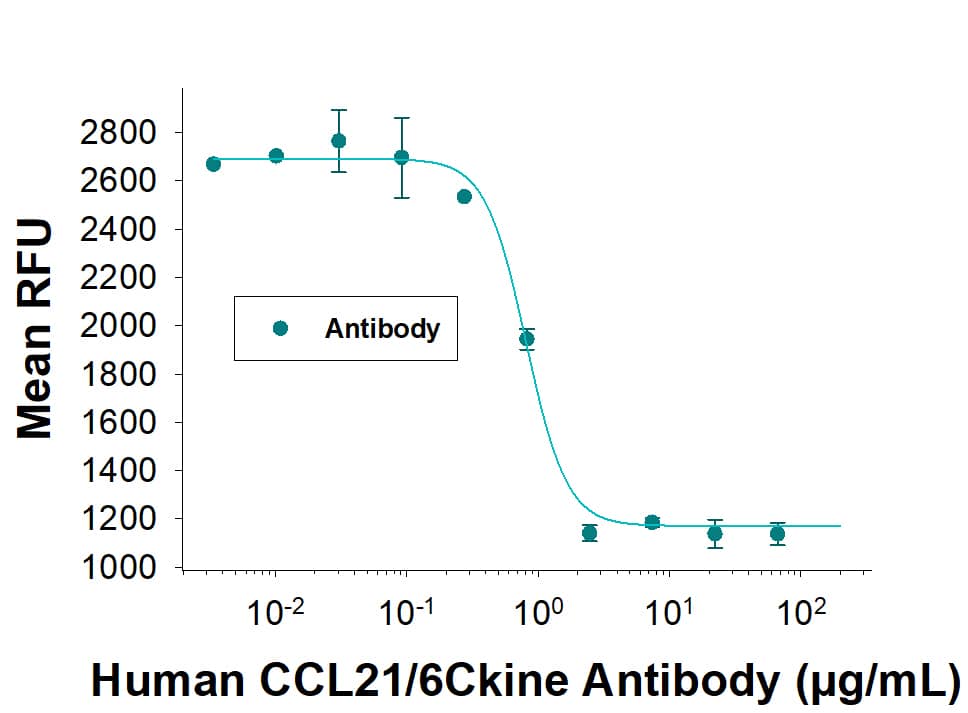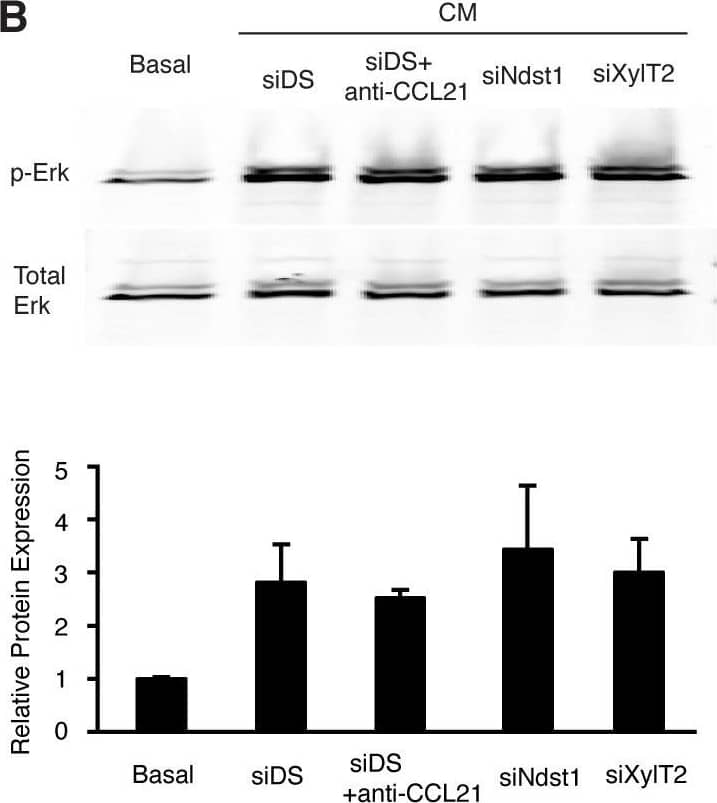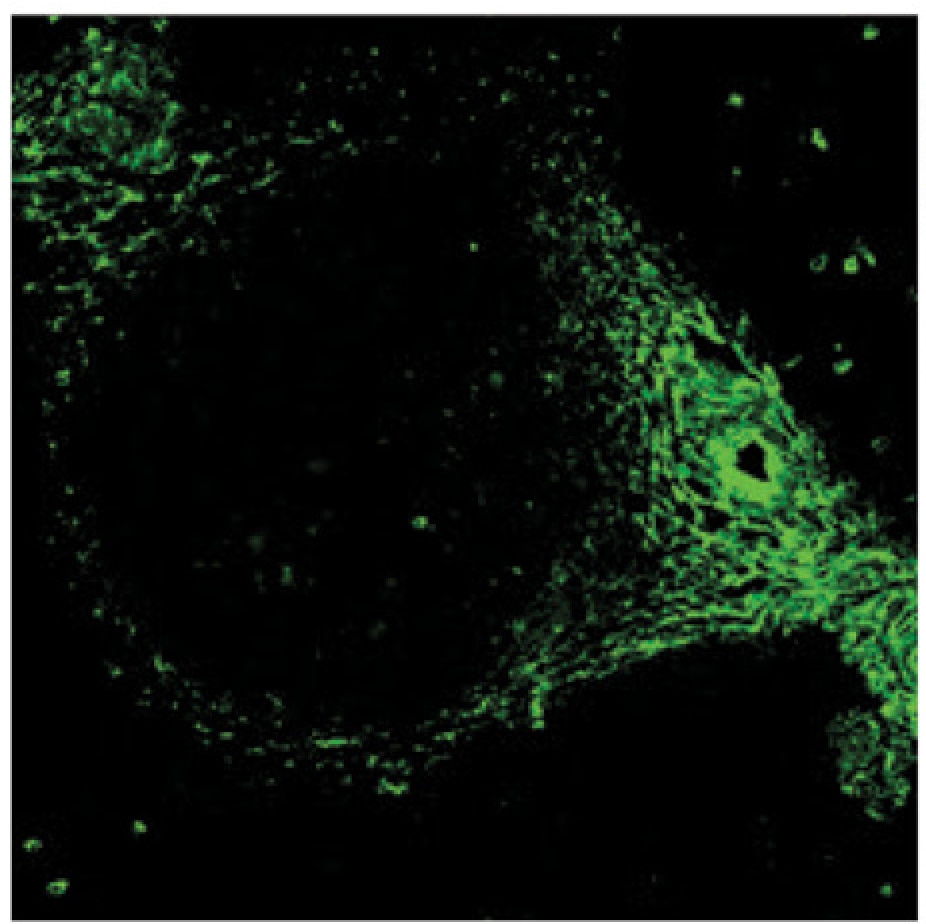Human CCL21/6Ckine Antibody Summary
Ser24-Pro134
Accession # Q6ICR7
*Small pack size (-SP) is supplied either lyophilized or as a 0.2 µm filtered solution in PBS.
Customers also Viewed
Applications
Please Note: Optimal dilutions should be determined by each laboratory for each application. General Protocols are available in the Technical Information section on our website.
Scientific Data
 View Larger
View Larger
CCL21/6Ckine in Human PBMCs. CCL21/6Ckine was detected in immersion fixed human peripheral blood mononuclear cells (PBMCs) using 10 µg/mL Goat Anti-Human CCL21/6Ckine Antigen Affinity-purified Polyclonal Antibody (Catalog # AF366) for 3 hours at room temperature. Cells were stained with the NorthernLights™ 557-conjugated Anti-Goat IgG Secondary Antibody (red; NL001) and counterstained with DAPI (blue). View our protocol for Fluorescent ICC Staining of Non-adherent Cells.
 View Larger
View Larger
Detection of Human CCL21/6Ckine by Simple WesternTM. Simple Western lane view shows lysates of Human lymph node, loaded at 0.2 mg/mL. A specific band was detected for CCL21/6Ckine at approximately 15 kDa (as indicated) using 20 µg/mL of Goat Anti-Human CCL21/6Ckine Antigen Affinity-purified Polyclonal Antibody (Catalog # AF366). This experiment was conducted under reducing conditions and using the 12-230 kDa separation system.
 View Larger
View Larger
Chemotaxis Induced by CCL21/6Ckine and Neutralization by Human CCL21/6Ckine Antibody. Measured by its ability to neutralize CCL21/6Ckine-induced chemotaxis in the BaF/3 mouse pro‑B cell line transfected with human CCR7. The Neutralization Dose (ND50) is typically 0.400-4.00 μg/mL in the presence of 50 ng/mL Recombinant Human CCL21/6Ckine.
Preparation and Storage
- 12 months from date of receipt, -20 to -70 °C as supplied.
- 1 month, 2 to 8 °C under sterile conditions after reconstitution.
- 6 months, -20 to -70 °C under sterile conditions after reconstitution.
Background: CCL21/6Ckine
6Ckine is a novel CC chemokine discovered independently by three groups from the EST database. 6Ckine, also named SLC (Secondary Lymphoid-tissue Chemokine), CCL21, and Exodus-2, shows 21-33% identity to other CC chemokines. 6Ckine contains the four conserved cysteines characteristic of beta chemokines plus two additional cysteines in its unusually long carboxyl-terminal domain. Human 6Ckine cDNA encodes a 134 amino acid (aa) residue, highly basic, precursor protein with a 23 aa residue signal peptide that is cleaved to form the predicted 111 aa residue mature protein. Mouse 6Ckine cDNA encodes a 133 aa residue protein with a 23 residue signal peptide that is cleaved to generate the 110 residue mature protein. Human and mouse 6Ckine are highly conserved, exhibiting 86% aa sequence identity. 6Ckine is constitutively expressed at high levels in lymphoid tissues such as lymph nodes, spleen, and appendix. In mouse, high levels of 6Ckine mRNA are also detected in the lung. The gene for human 6Ckine has been localized at human chromosome 9p13 rather than chromosome 17 where the genes of many human CC chemokines are clustered. The 6Ckine gene location is within a region of about 100 kb from the gene for MIP-3 beta /ELC, another novel CC chemokine.
Unlike most CC chemokines, 6Ckine is not chemotactic for monocytes. Recombinant mouse 6Ckine is chemotactic in vitro for thymocytes and activated T cells. Recombinant human 6Ckine has been shown to be chemotactic for some human T cell lines, resting PBL, and cultured T cells expanded with PHA and IL-2. 6Ckine has also been reported to inhibit hemopoietic progenitor colony formation in a dose-dependent manner. 6Ckine acts via a class of as yet unidentified CC receptors on both T cells and B cells that are not shared by any other CC chemokines so far tested.
- Hedrick, J.A. and A. Zlotnik (1997) J. Immunol. 159:1589.
- Hromas, R. et al. (1997) J. Immunol. 159:2554.
- Nagira, M. et al. (1997) J. Biol. Chem. 272:19518.
Product Datasheets
Citations for Human CCL21/6Ckine Antibody
R&D Systems personnel manually curate a database that contains references using R&D Systems products. The data collected includes not only links to publications in PubMed, but also provides information about sample types, species, and experimental conditions.
29
Citations: Showing 1 - 10
Filter your results:
Filter by:
-
Structural Remodeling of the Human Colonic Mesenchyme in Inflammatory Bowel Disease.
Authors: Kinchen J, Chen HH, Parikh K et al.
Cell
-
Molecular and spatial analysis of tertiary lymphoid structures in Sjogrens syndrome
Authors: Nayar, S;Turner, J;Asam, S;Fennell, É;Pugh, M;Colafrancesco, S;Berardicurti, O;Smith, C;Flint, J;Teodósio, A;Iannizzotto, V;Gardner, D;Roon, J;Korsunsky, I;Howdle, D;Brenner, M;Coles, M;Powrie, F;Raychaudhuri, S;Frei, A;Lassen, K;Bowman, S;Ng, W;Croft, A;Filer, A;Fisher, B;Buckley, C;Barone, F;
Nature communications
Species: Human
Sample Types: Whole Cells
Applications: Flow Cytometry -
A census of the lung: CellCards from LungMAP
Authors: Xin Sun, Anne-Karina Perl, Rongbo Li, Sheila M. Bell, Eniko Sajti, Vladimir V. Kalinichenko et al.
Developmental Cell
-
Urinary small extracellular vesicles derived CCL21 mRNA as biomarker linked with pathogenesis for diabetic nephropathy
Authors: Y Feng, X Zhong, HF Ni, C Wang, TT Tang, LT Wang, KY Song, RN Tang, H Liu, BC Liu, LL Lv
Journal of Translational Medicine, 2021-08-17;19(1):355.
Species: Rat
Sample Types: Whole Tissue
Applications: IHC -
Helicobacter pylori-induced Rev-erb&alpha fosters gastric bacteria colonization by impairing host innate and adaptive defense
Authors: FY Mao, YP Lv, CJ Hao, YS Teng, YG Liu, P Cheng, SM Yang, W Chen, T Liu, QM Zou, R Xie, JY Xu, Y Zhuang
Cellular and Molecular Gastroenterology and Hepatology, 2021-03-03;0(0):.
Species: Human
Sample Types: Whole Cells
Applications: Neutralization -
Lymphatic Metastasis of NSCLC Involves Chemotaxis Effects of Lymphatic Endothelial Cells through the CCR7-CCL21 Axis Modulated by TNF-&alpha
Authors: S Zhang, H Wang, Z Xu, Y Bai, L Xu
Genes (Basel), 2020-11-04;11(11):.
Species: Human
Sample Types: Whole Cells
Applications: Neutralization -
Inhaled TLR9 Agonist Renders Lung Tumors Permissive to PD-1 Blockade by Promoting Optimal CD4+ and CD8+ T cell Interplay
Authors: M Gallotta, H Assi, É Degagné, SK Kannan, RL Coffman, C Guiducci
Cancer Res., 2018-06-26;0(0):.
Species: Mouse
Sample Types: Whole Tissue
Applications: IHC-P -
Analysis of microRNA expression in the thymus of Myasthenia Gravis patients opens new research avenues
Authors: Mélanie A. Cron, Solène Maillard, Fabien Delisle, Nolwenn Samson, Frédérique Truffault, Maria Foti et al.
Autoimmunity Reviews
-
Thymus involvement in early-onset myasthenia gravis
Authors: Mélanie A. Cron, Solène Maillard, José Villegas, Frédérique Truffault, Muriel Sudres, Nadine Dragin et al.
Annals of the New York Academy of Sciences
-
An initial investigation into endothelial CC chemokine expression in the human rheumatoid synovium.
Authors: Rump L, Mattey D, Kehoe O, Middleton J
Cytokine, 2017-09-01;97(0):133-140.
Species: Human
Sample Types: Whole Tissue
Applications: IHC-Fr -
Differential CCR7 Targeting in Dendritic Cells by Three Naturally Occurring CC-Chemokines
Authors: Gertrud M. Hjortø, Olav Larsen, Anne Steen, Viktorija Daugvilaite, Christian Berg, Suzan Fares et al.
Frontiers in Immunology
-
The pathological features of ectopic lymphoid neogenesis in idiopathic dacryoadenitis
Authors: Jie Guo, Jiang Qian, Rui Zhang
BMC Ophthalmology
-
Preferential recruitment of Th17 cells to cervical cancer via CCR6-CCL20 pathway.
Authors: Yu, Qing, Lou, Xiang-mi, He, Yan
PLoS ONE, 2015-03-13;10(3):e0120855.
Species: Human
Sample Types: Cell Culture Supernates
Applications: Bioassay -
Intracellular coexpression of CXC- and CC- chemokine receptors and their ligands in human melanoma cell lines and dynamic variations after xenotransplantation.
Authors: Pinto S, Martinez-Romero A, O'Connor J, Gil-Benso R, San-Miguel T, Terradez L, Monteagudo C, Callaghan R
BMC Cancer, 2014-02-22;14(0):118.
Species: Human
Sample Types: Whole Cells
Applications: ICC -
Lymphatic specific disruption in the fine structure of heparan sulfate inhibits dendritic cell traffic and functional T cell responses in the lymph node.
Authors: Yin X, Johns S, Kim D, Mikulski Z, Salanga C, Handel T, Macal M, Zuniga E, Fuster M
J Immunol, 2014-02-03;192(5):2133-42.
Species: Human
Sample Types: Whole Cells
Applications: Neutralization -
Feasibility of the use of combinatorial chemokine arrays to study blood and CSF in multiple sclerosis.
Authors: Edwards, Keith R, Goyal, Jaya, Plavina, Tatiana, Czerkowicz, Julie, Goelz, Susan, Ranger, Ann, Cadavid, Diego, Browning, Jeffrey
PLoS ONE, 2013-11-20;8(11):e81007.
Species: Human
Sample Types: CSF
Applications: Immunoassay Development -
Lymphoid Aggregates That Resemble Tertiary Lymphoid Organs Define a Specific Pathological Subset in Metal-on-Metal Hip Replacements
Authors: Saloni Mittal, Matthew Revell, Francesca Barone, Debbie L. Hardie, Gulraj S. Matharu, Alison J. Davenport et al.
PLoS ONE
-
CCR7 Mediates Directed Growth of Melanomas Towards Lymphatics
Authors: MAXINE S. EMMETT, SILVIA LANATI, DARRYL B.A. DUNN, OLIVER A. STONE, DAVID O. BATES
Microcirculation
Species: Mouse
Sample Types: In Vivo
Applications: In vivo assay -
The Vaccine-site Microenvironment Induced by Injection of Incomplete Freund's Adjuvant, With or Without Melanoma Peptides
Authors: Rebecca C. Harris, Kimberly A. Chianese-Bullock, Gina R. Petroni, Jochen T. Schaefer, Louis B. Brill, Kerrington R. Molhoek et al.
Journal of Immunotherapy
-
Tertiary Lymphoid Organs in Lymphatic Malformations
Authors: Andrew L. Kirsh, Sharon L. Cushing, Eunice Y. Chen, Stephen M. Schwartz, Jonathan A. Perkins
Lymphatic Research and Biology
Species: Human
Sample Types: Whole Tissue
Applications: Immunohistochemistry -
Inflammation-induced secretion of CCL21 in lymphatic endothelium is a key regulator of integrin-mediated dendritic cell transmigration.
Authors: Johnson LA, Jackson DG
Int. Immunol., 2010-08-25;22(10):839-49.
Species: Human
Sample Types: Cell Lysates, Whole Cells
Applications: Neutralization, Western Blot -
CCL21 overexpressed on lymphatic vessels drives thymic hyperplasia in myasthenia.
Authors: Berrih-Aknin S, Ruhlmann N, Bismuth J, Cizeron-Clairac G, Zelman E, Shachar I, Dartevelle P, de Rosbo NK, Le Panse R
Ann. Neurol., 2009-10-01;66(4):521-31.
Species: Human
Sample Types: Tissue Homogenates, Whole Tissue
Applications: ELISA Development, IHC -
CXCL12 is essential for migration of activated Langerhans cells from epidermis to dermis.
Authors: Ouwehand K, Santegoets SJ, Bruynzeel DP, Scheper RJ, de Gruijl TD, Gibbs S
Eur. J. Immunol., 2008-11-01;38(11):3050-9.
Species: Human
Sample Types: Whole Cells
Applications: Neutralization -
Lymphatic precollectors contain a novel, specialized subpopulation of podoplanin low, CCL27-expressing lymphatic endothelial cells.
Authors: Wick N, Haluza D, Gurnhofer E, Raab I, Kasimir MT, Prinz M, Steiner CW, Reinisch C, Howorka A, Giovanoli P, Buchsbaum S, Krieger S, Tschachler E, Petzelbauer P, Kerjaschki D
Am. J. Pathol., 2008-09-04;173(4):1202-9.
Species: Human
Sample Types: Whole Tissue
Applications: IHC-Fr, IHC-P -
Autologous chemotaxis as a mechanism of tumor cell homing to lymphatics via interstitial flow and autocrine CCR7 signaling.
Authors: Shields JD, Fleury ME, Yong C, Tomei AA, Randolph GJ, Swartz MA
Cancer Cell, 2007-06-01;11(6):526-38.
Species: Human
Sample Types: Whole Cells, Whole Tissue
Applications: IHC, Neutralization -
Oncostatin M enhances CCL21 expression by microvascular endothelial cells and increases the efficiency of dendritic cell trafficking to lymph nodes.
Authors: Sugaya M, Fang L, Cardones AR, Kakinuma T, Jaber SH, Blauvelt A, Hwang ST
J. Immunol., 2006-12-01;177(11):7665-72.
Species: Human
Sample Types: Cell Lysates, Whole Cells
Applications: Neutralization, Western Blot -
Cutting edge: nonproliferating mature immune cells form a novel type of organized lymphoid structure in idiopathic pulmonary fibrosis.
Authors: Marchal-Somme J, Uzunhan Y, Marchand-Adam S, Valeyre D, Soumelis V, Crestani B, Soler P
J. Immunol., 2006-05-15;176(10):5735-9.
Species: Human
Sample Types: Whole Tissue
Applications: IHC-Fr -
Trafficking pathways and characterization of CD4 and CD8 cells recruited to the skin of humans experimentally infected with Haemophilus ducreyi.
Authors: Humphreys TL, Baldridge LA, Billings SD, Campbell JJ, Spinola SM
Infect. Immun., 2005-07-01;73(7):3896-902.
Species: Human
Sample Types: Whole Tissue
Applications: IHC-P -
Developing neonatal rabbit appendix, a primary lymphoid organ, is seeded by immature blood-borne B cells: evidence for roles for CD62L/PNAd, CCR7/CCL21, alpha4beta1 and LFA-1.
Authors: Sinha RK, Mage RG
Dev. Comp. Immunol., 2004-06-01;28(7):829-41.
Species: Rabbit
Sample Types: Whole Tissue
Applications: IHC
FAQs
No product specific FAQs exist for this product, however you may
View all Antibody FAQsIsotype Controls
Reconstitution Buffers
Secondary Antibodies
Reviews for Human CCL21/6Ckine Antibody
Average Rating: 5 (Based on 2 Reviews)
Have you used Human CCL21/6Ckine Antibody?
Submit a review and receive an Amazon gift card.
$25/€18/£15/$25CAN/¥75 Yuan/¥2500 Yen for a review with an image
$10/€7/£6/$10 CAD/¥70 Yuan/¥1110 Yen for a review without an image
Filter by:
CCL21 staining and negative control





















